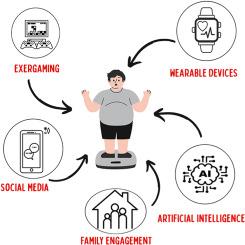Integrating digital health into pediatric obesity management: Current practices and future perspectives
引用次数: 0
Abstract
Background
Childhood obesity is a growing global health concern with significant cardiometabolic consequences. While conventional treatment approaches often fail to achieve sustained outcomes, emerging digital health interventions (DHIs)—including mobile applications, educational video games, wearable devices, telemedicine, and social media—offer innovative tools to support lifestyle modifications and enhance therapeutic adherence.
Methods
In this narrative review, we focus on the main evidence regarding the effectiveness of DHIs for pediatric obesity treatment according to target (children vs. children with families) and duration (short- and long-term interventions). We also review their impact on clinical (e.g. body mass index, body composition, etc.), behavioral (physical activity, nutrition, adherence) and psychosocial (motivation, engagement) outcomes. In addition, future trends in the field are also discussed.
Results
DHIs demonstrate short-term effectiveness, especially when they incorporate personalization, interactivity, and family involvement. Mobile applications and educational video games boost nutritional literacy and promote healthy behaviours. Wearable devices encourage physical activity awareness, though adherence often varies. Long-term, family-based interventions help reduce dropout rates and reinforce lasting healthy habits. Guided use of social media can facilitate health education but also exposes users to risks such as misinformation and unhealthy food marketing. Despite these advancements, DHIs still face major challenges, including unequal access, data privacy concerns, and a lack of long-term outcome evaluations.
Conclusion
The increasing prevalence of pediatric obesity underscores the urgent need for effective and sustainable treatment strategies. DHIs represent a promising, scalable approach for managing childhood obesity, but their long-term sustainability and effectiveness remain to be fully established. Ongoing technological advancements—and their thoughtful integration into existing healthcare frameworks—present significant opportunities to develop innovative, patient-centered therapeutic solutions that can improve engagement, adherence, and long-term health outcomes in children and adolescents with obesity.

将数字健康整合到儿童肥胖管理中:当前实践和未来展望
儿童肥胖是一个日益严重的全球健康问题,具有显著的心脏代谢后果。虽然传统治疗方法往往无法取得持续的效果,但新兴的数字健康干预措施(DHIs)——包括移动应用程序、教育视频游戏、可穿戴设备、远程医疗和社交媒体——提供了支持改变生活方式和增强治疗依从性的创新工具。方法在这篇叙述性综述中,我们根据目标(儿童与有家庭的儿童)和持续时间(短期和长期干预)关注DHIs治疗儿童肥胖的有效性的主要证据。我们还回顾了它们对临床(如体重指数、身体成分等)、行为(身体活动、营养、依从性)和心理社会(动机、参与)结果的影响。此外,还讨论了该领域的未来发展趋势。结果dhis显示出短期的有效性,特别是当它们结合个性化、互动性和家庭参与时。移动应用程序和教育视频游戏提高了营养素养,促进了健康行为。可穿戴设备鼓励人们意识到体育锻炼的重要性,但坚持与否往往各不相同。以家庭为基础的长期干预措施有助于降低辍学率和加强持久的健康习惯。有指导地使用社交媒体可以促进健康教育,但也使用户面临错误信息和不健康食品营销等风险。尽管取得了这些进步,但DHIs仍然面临着重大挑战,包括不平等获取、数据隐私问题以及缺乏长期结果评估。结论儿童肥胖症患病率的不断上升,迫切需要有效和可持续的治疗策略。DHIs是一种很有前途的、可扩展的儿童肥胖管理方法,但其长期可持续性和有效性仍有待充分确定。持续的技术进步及其与现有医疗保健框架的周到整合为开发创新的、以患者为中心的治疗解决方案提供了重要机会,这些解决方案可以提高儿童和青少年肥胖患者的参与度、依从性和长期健康结果。
本文章由计算机程序翻译,如有差异,请以英文原文为准。
求助全文
约1分钟内获得全文
求助全文

 求助内容:
求助内容: 应助结果提醒方式:
应助结果提醒方式:


